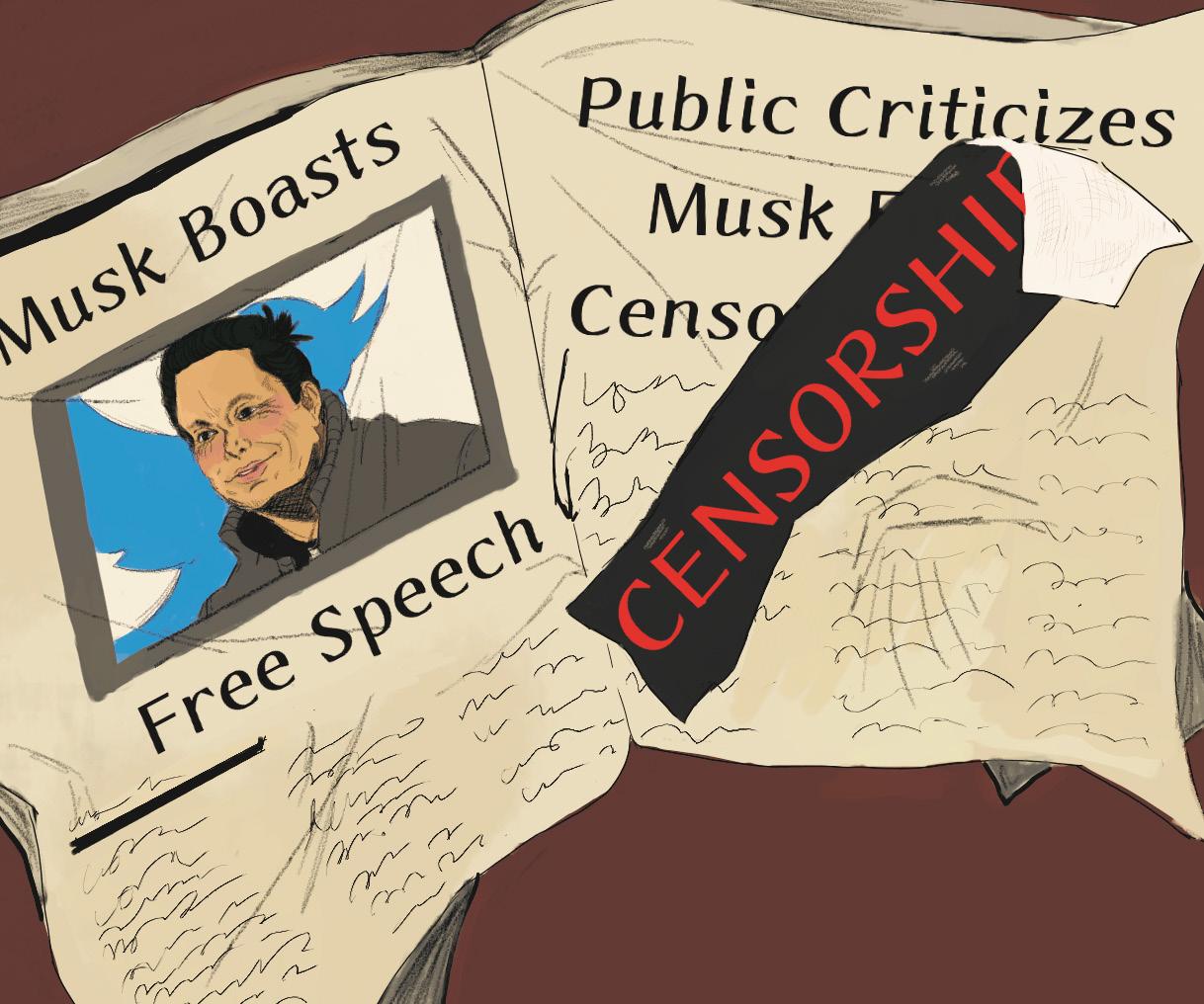
6 minute read
Twitter is in terrible hands and it shows
Twitter is under new management and everyone is feeling his wrath.
On Oct. 27, Elon Musk finished his purchase of Twitter after a six month-long acquisition.
Following the initial announcement of the acquisition, the concept of Musk owning Twitter seemed like a joke. Memes littered social media apps for months. But with the purchase of the site now finalized, the future of Twitter already looks bleak.
Elon Musk is the CEO of several companies, Twitter is simply the newest addition to the list. With an estimated net worth of $148 billion, according to Bloomberg Billionaires Index, buying Twitter for $44 billion barely made a dent in his fortune.
Musk is no stranger to pulling stunts, prior to his acquisition of Twitter the mogul had amassed quite the platform and attention due to his antics on the site. From tweeting COVID-19 misinformation to offering a grossly oversimplified resolution to the war in Ukraine, Musk’s designer rose-colored glasses has clouded his ability to understand the consequences of his actions.
Though Musk may be a CEO of several companies, his work in cars and rockets does not translate effectively into the media.
Twitter was one of the least censored of social media site. But
VIEWPOINTS those who participated in spewing hate speech were often suspended or banned from the platform entirely, as observed with former President Donald Trump. With Musk as a proponent of ‘free speech,’ it comes as little surprise that racist rhetoric has increased. And with little being done to prevent or condemn the hate speech being spread, Twitter is becoming a hostile environment for all minorities. The NAACP has met with Musk to discuss the increase in hate speech since his acquisition. They acknowledged the sanctity of free speech while also urging Musk not to let Donald

Trump back onto the platform and to denounce further use of it. Musk may have acknowledged the hate speech on Twitter, but holding true to his word to put safeguards on the site is a different matter.
Unfortunately, to some Americans, free speech has become synonymous with hate speech. The fact that Musk’s very presence made racists feel welcomed to share their bigoted opinions already shows what kind of platform he has created.

Perhaps Musk’s most notable offense was laying off thousands of employees. Many former Twitter employees took to the site after discovering they could no longer log on to work.
Employees that have worked at the company for years, contributing hours of creativity, have been fired with no other notice. Musk displayed absolutely zero grace or respect to his employees.
It is evident that Musk’s reign over Twitter has already been problematic, but the future of Twitter seems to no longer be guaranteed. Twitter has always been somewhat controversial, yet somewhat controlled.
Under Musk’s control however, Twitter seems doomed to become a forum where bigots feel entitled to divulge their unsolicited opinions, and employees behind the scenes are exploited for their labor.
There is something exciting about being in a society for your school, living together with the same interests and garnering a sense of community among each other, but it is unfortunate that Greek life societies have such a different reality, a cultish look.
On top of obscene sums of money pocketed by major greek-letter organizations, it’s hard to imagine why anyone would want to live together in one house following far stricter rules than campus living, the social image to keep up, the endless climb. Finding friends is always going to be hard, no doubt, so maybe there’s no right to speak on Greek living.
It just seems that if there were a show of hands in one room, there wouldn’t be a whole ton who made a friend via physical branding or general harassment, though.
That’s hazing —by the way—a practice that has yet to die out, most notably the 2018 incident with a TCU student. Being able to coerce students like that rings a cult shaped bell, right?
Think of Jonestown, the Manson Family, or Heaven’s Gate, all cults with a history of making their members do harmful acts to themselves and others.
Devotion seems like the most crucial component, without that it makes Greek life less credible, it loses the novelty of being in a sorority or fraternity because you are supposed to be sworn into this exclusive group. Similarly, cults begin to dissipate if there isn’t any serious allegiance to the cause.
So, students are initiated in extreme and odd ways that will ensure their loyalty.
Much like cults, Greek life brings a steady stream of people joining based on hope. There are certain weeks at the beginning of universities’ school year, dedicated to “rushing.”
Most rushers are hopeful and looking for community, since most recruitment is towards freshmen with little to no connections in their new university.
The idea of a sorority or frat demanding a pledge to swear loyalty doesn’t even border a line, the line was way back behind the phrase “pledge” and at this point is in deep weird territory.
Wear a certain color, don’t step on any campus grass, all of these different things something pledges must do. And to think there are things people don’t know about, things the sorority or frat don’t tell people.
Cults have a draw for a reason, people don’t just join them for fun. Greek life’s draw is community and connections. There are special benefits, and because of the amount of charities and donations partaken in, they contribute to the community and in turn the community applauds them. In the end, their name being known is the biggest return.
More people hear about them, and more people want to join.
It’s something that goes far deeper than what’s been touched on, yes, and there may be things about Greek life that will never see the light of day. All people can do is work off of what has been leaked and what is observable, and what’s observable isn’t looking so good, they’re looking a little cultish.
While some may live by the sentiment, “family is everything,” this can be harmful for those who weren’t fortunate enough to experience healthy relationships with family members.
Sayings such as, “you’re nothing without family,” can perpetuate this expectation that families support one another when that’s not always the case. Growing up in a dysfunctional home can make it a treacherous journey to feeling safe in one’s identity especially when so much of it is so closely knitted to those who raised you.
I think it’s important for people to try and consider who’s in front of them when attempting to say something they think may be universal. You are something without family. You have inherent worth as a human being. Families can also be chosen. They don’t have to consist of people you are related to.
Friends and pets can be everything, passions can be everything and things that uplift and empower can be everything. Not everyone has the privilege to say that they came from households that made them feel strong and worthy. Whether the negative experiences were filled with malice or not, it doesn’t change the fact that sometimes mothers and daughters don’t make up in the end.
Sometimes a father isn’t forgiven, and every once in a while siblings find happiness in not having such a close relationship.
Part of what can make growing up a beautiful experience is learning about oneself. Resonating with certain hobbies and interests and recognizing yourself in certain people. Feeling at home in certain spaces. People aren’t bound to their pasts.
The first time I heard the saying was probably in elementary school. Looking back, I wonder if there were any kids who felt out of place because they couldn’t resonate with the idea that parents always put their children first. While there’s value in the message, it’s an easy way to create an opportunity for people to feel outcasted. To teach children, one of society’s most vulnerable groups, that family is everything can actually be quite dangerous. It’s a time in a person’s life when they are trying to figure out what safe is and what it looks like.
The saying can result in a child feeling unsure of themselves and what they are experiencing because they’ve been taught that families love and support one another, as if that’s always the case. Sometimes the saying can be used as a tactic to keep people tied to family dynamics that are filled with toxicity.
Teaching people about their worthiness and importance as a human may be a better sentiment to focus on due to the fact that, no matter what someone has experienced, or where one may come from, it is an individual’s prerogative to define themselves and keep redefining for as long they live. No matter how many families they choose to create along the way.





